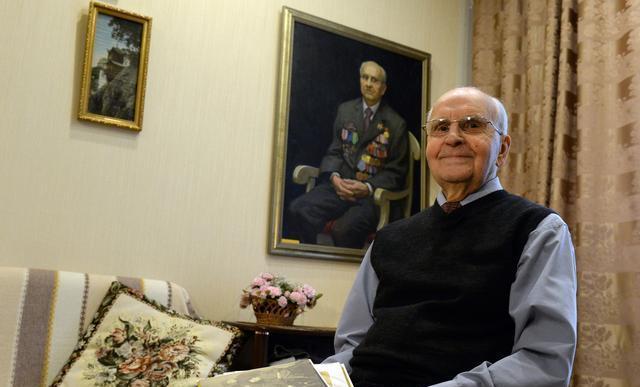
Author: Wang Dehua
Soviet veteran Nushkin recalls the day of commemorating the 60th anniversary of the liberation of Auschwitz. It was a "grand celebration" and the role of the Red Army was recognized as the most important. However, 15 years on, things have changed.
Over time, the "tone" of these anniversaries has changed, and attitudes toward Soviet veterans have "changed dramatically." Nushkin said the role played by the Red Army in the liberation of Poland was no longer respected in Europe, and "implicit accusations" began to creep up, saying that the Red Army was an "aggressor" and had not really liberated Poland. In 2015, Moscow's relations with the rest of Europe became so frosty that Putin was not even officially invited to the 70th anniversary of the liberation of Auschwitz.
Nushkin told Russia Today that over the years, he was surprised to find that many Poles and other Europeans believed that American soldiers liberated Auschwitz. Even when he went to Krakow to take part in the filming of a documentary, some of the Poles he met were "convinced" that the Americans had liberated them.
"They don't understand why they've been misunderstood for so long. It's something that's etched in their memories," he added, adding that he wouldn't be angry at people who didn't know the whole story, "and I don't take it to heart." That's how they grew up. That's the information they get. ”
A long way
In 1943, at the age of 20, Nushkin was trained on a train and sent to the front lines to train for machine guns and mortars. At the end of 1944, the Red Army liberated Russian territory and marched to Poland.
"Our commander talked to us a lot before crossing the border. They say Poland is our ally, a victim of war. Our task is to liberate the fraternal country of Poland. We were told about their culture," he recalled.
By January 1945, the Soviet Union was ready to attack on several fronts. The war was scheduled for January 20, but due to heavy Allied casualties, Churchill demanded that Stalin act earlier, and the attack was advanced to January 12.
"Our division attacked the Nazis near Krakow. After a week of continuous fighting, we reached our destination. Due to its beautiful architecture, the Red Army was instructed to make sure it remained as intact as possible.
Nushkin celebrated his 21st birthday with local Poles, who served "like a family dinner" tableware in their homes. "I remember the little boys, how excited the hostess was when she saw us." He said.
His division soon crossed Krakow, and although he was a commander, Nushkin could not be sure where his men were going.
He said, "I'm a commander, but even I only know what's a few kilometers away, not much more." "The whole German army was retreating, but they fought back in every village, in every family."
Witness hell
One day, after driving the Germans out of a small village, his division found a large field surrounded by barbed wire. Some sort of barracks could be seen outside the barbed wire, which made one think it was a German military base. "At dusk, we were told to camp in villages near the barbed wire and stay vigilant," he said.
In the morning, they were ordered to conduct a thorough search of the area around the camp, but were shot from inside. They radioed artillery support, but were told that the building in front of them was a prisoner-of-war camp and that artillery was not allowed to fire.
"They asked us not to return fire so that stray bullets wouldn't hurt the prisoners," he explained.
Only then, when they saw the prisoners behind the fence, did Nushkin's division realize that they had arrived at Auschwitz. It turned out that Nushkin was one of the first Soviet soldiers to enter the notorious concentration camp. "[The prisoners] were the first to realize who we were, and we saw the welcome," he said.
Later, when the Red Army began searching these buildings in search of Soviet prisoners of war, the horrors of the place were fully exposed.
He said, "We see haggard faces and people shiver with cold. Some wore prison uniforms, and some were wrapped in plaid blankets or carpets. We saw their eyes. There is a warm spark in them, and they know they are free. Everything they went through was over. “”
Before they entered the camp, there was a smell of burning things. They had smelled similar smells before, but this time it was "particularly pungent and heavy." Later, Nushkin learned that the Nazis had blown up the crematorium a week earlier, but the bodies were still scattered around the camp. They were lined up and ignited like wood.
The Soviets spent the night in the camp. In the morning, the medical battalion began to take care of the prisoners, and the Soviet logistics force had caught up. Later, Nushkin traveled to what was then Czechoslovakia, where he was injured and celebrated Victory Day in hospital.
After the war, Nushkin retired, underwent new training, and found a job at the agency in charge of the atomic bomb program. He still visited Poland frequently, but he noticed that perceptions of the war began to shift, and the important role of the Red Army faded away and was replaced by stories of American heroism.
However, in all attempts to "distort history," he said, people, even in the Western media, are generally more interested in "the true story of Auschwitz" than in "today's fake story."